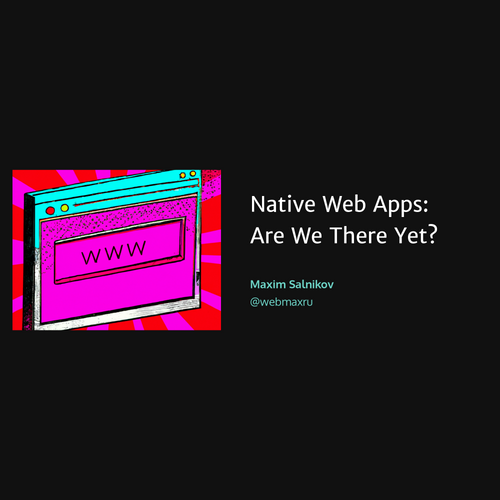using Angular Service Worker
Maxim Salnikov
Angular GDE
Automatic
Progressive Web Apps
How to create an Angular Progressive Web App?
Natively
Maxim Salnikov

-
Full-stack engineer at ForgeRock
-
Google Developer Expert in Angular
-
PWA evangelist / trainer
-
ngVikings conference organizer


ngVikings.org
-
All sides of Angular ecosystem presented by international experts
-
100% community-driven event from developers for developers
-
Only technical and practical Angular content

March 1-2, Helsinki, Finland

Progressive Web App

... attempts to combine features offered by most modern browsers with the benefits of mobile experience
... web apps that use the latest web technologies.
10 characteristics
-
Progressive
-
Discoverable
-
Linkable
-
App-like
-
Responsive
-
Connectivity-independent
-
Re-engageable
-
Installable
-
Fresh
-
Safe
Service worker
Logically
Physically
JS
-file
App
Service worker

❤

Angular Service Worker
Wait a sec!
-
1000+ developers
-
Major browsers/frameworks/libs reps
Generate a new Angular PWA
$ ng new myProgressiveApp --service-workerStarting from Angular CLI 1.6
$ ng build --prodngsw-worker.js
ngsw.json
dist/


Adding NGSW to the existing app
$ ng set apps.0.serviceWorker=true
$ npm install @angular/service-worker --save
1. Install the package
2. Enable build support
3. Register NGSW for your app
4. Create configuration file
Service worker build support in the CLI
Build
Copy
src/ngsw-config.json
dist/ngsw.json
ngsw-worker.js
dist/
node_modules/@angular...
Can be npm-scripted for Angular CLI 1.5!
Registering NGSW
import { ServiceWorkerModule } from '@angular/service-worker';import { environment } from '../environments/environment';...
@NgModule({
...
imports: [
...
]
})
export class AppModule { } ServiceWorkerModule.register('/ngsw-worker.js',
{ enabled: environment.production }),app.module.ts
NGSW configuration file
src/ngsw-config.json
{
"index": "/index.html",
"assetGroups": [...],
"dataGroups": [...]
}App shell
assetGroups
{
"name": "app",
"installMode": "prefetch",
"resources": {...}
}App shell resources
assetGroups / "app" / resources
"resources": {
} "versionedFiles": [
"/*.bundle.css",
"/*.bundle.js",
"/*.chunk.js"
], "files": [
"/favicon.ico",
"/index.html"
],App shell / on-demand
assetGroups
{
"name": "assets",
"installMode": "lazy",
"updateMode": "prefetch",
"resources": {...}
}App shell / on-demand
assetGroups / "assets" / resources
"resources": {
} "files": [
"/assets/**"
], "urls": [
"https://fonts.googleapis.com/**",
"https://fonts.gstatic.com/**"
]Runtime caching
dataGroups
{
"name": "api-freshness",
"urls": [
"/api/breakingnews/**"
],
} "cacheConfig": {
"strategy": "freshness",
"maxSize": 10,
"maxAge": "12h",
"timeout": "10s"
}Runtime caching
dataGroups
{
"name": "api-performance",
"urls": [
"/api/archive/**"
],
} "cacheConfig": {
"strategy": "performance",
"maxSize": 100,
"maxAge": "365d"
}Push notifications
import { SwPush } from '@angular/service-worker';
constructor(private swPush: SwPush) {}subscribeToPush() {
this.swPush.requestSubscription({
serverPublicKey: this.VAPID_PUBLIC_KEY
})
.then(pushSubscription => {
// Pass subscription object to backend
})
}push.component.ts
Push notifications / send
{
"notification": {
}
}server-side.js / sendNotification payload
"title": "Very important notification",
"body": "Angular Service Worker is cool!",
"icon": "https://angular.io/assets/logo.png",
"actions": [
{
"action": "gocheck",
"title": "Go and check"
}
],
...
App version updates
v1
v2
v1
v1
v2
Server
Browser
v2
Check for updates
import { SwUpdate } from '@angular/service-worker';
constructor(private swUpdate: SwUpdate) {}this.swUpdate.available.subscribe(event => {
let snackBarRef = this.snackBar
.open('Newer version of the app is available', 'Refresh');
snackBarRef.onAction().subscribe(() => {
window.location.reload()
})
})updates.component.ts

Hint #1: Debugging update flow
1. Keep DevTools closed & wait...
3. Use code snippets
Every time the Angular service worker starts, it checks for updates to the app by looking for updates to the ngsw.json manifest.
this.swUpdate.available.subscribe(event => {});Behaviour to be changed

2. Unload browser from memory
this.swUpdate.checkForUpdate()- OR -
Hint #2: Checking the status
https://yourwebsite.com/ngsw/state
NGSW Debug Info:
Driver state: NORMAL ((nominal))
Latest manifest hash: cd4716ff2d3e24f4292010c929ff429d9eeead73
Last update check: 9s215u
=== Version 34c3fd2361735b1330a23c32880640febd059305 ===
Clients: 7eb10c76-d9ed-493a-be12-93f305394a77
=== Version cd4716ff2d3e24f4292010c929ff429d9eeead73 ===
Clients: ee22d69e-37f1-439d-acd3-4f1f366ec8e1
=== Idle Task Queue ===
Last update tick: 4s602u
Last update run: 9s222u
Task queue:
Debug log:Hint #3: Kill switch
1. Long way
ng set apps.0.serviceWorker=false
ng build --prod
...deploy2. Short way
rm dist/ngsw.json
...deployMain available features
App Shell
Runtime Caching
Push Notifications
Smart Updates
Angular Service Worker advantages
-
Essential features are config-driven
-
Decoupled updates model
-
Integrity checks
-
Doing things in Angular way
On the roadmap
-
Integration with server-side rendering (app-shell)
-
Better debugging support
-
Make Angular app progressive by default
-
Documentation!


Thank you!
@webmaxru
Maxim Salnikov
Questions?
Automatic Progressive Web Apps using Angular Service Worker
By Maxim Salnikov
Automatic Progressive Web Apps using Angular Service Worker
Progressive Web Apps are the next big thing for the web. They combine the advantages of two platforms: searchability and shareability of the web with capabilities and performance of native mobile. As a result, web developers can use their favourite tools to build installable, re-engageable, connectivity independent apps, that can bring native-like performance and user experience. The Angular Service Worker makes it easy to get started building PWA. It’s developed to automate main routines and provide us with some nice tools to control the progressive app behaviour. During this practical session, we'll have a look at NGSW’s main components, and how they take our web app to the next level. With just some simple updates we’ll get installable, offline-capable, mobile-network-friendly Angular app re-engaging users by push-notifications.
- 5,061



